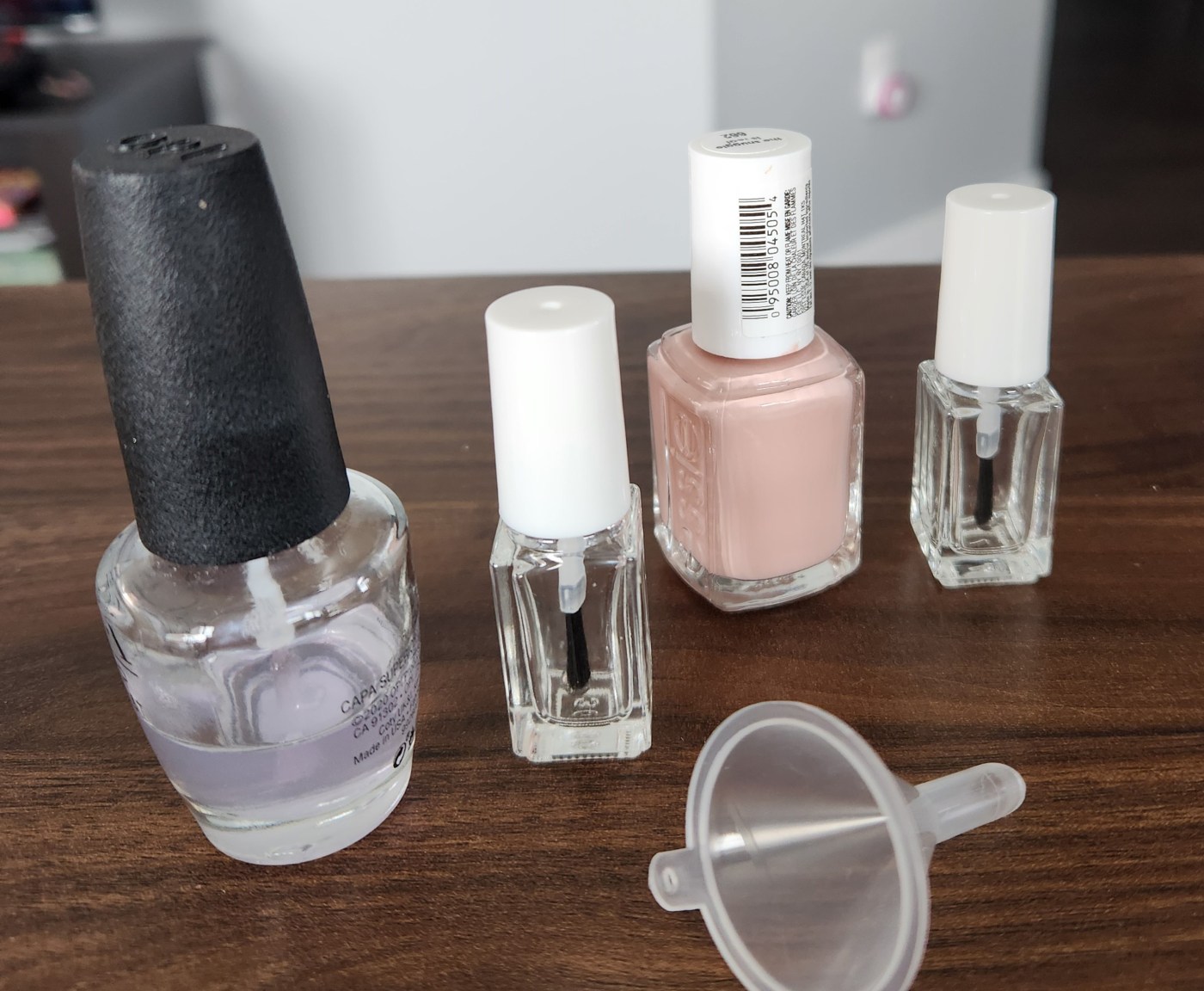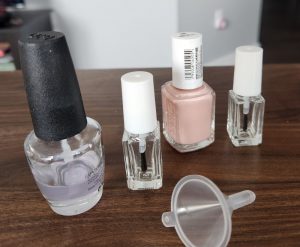
Column: Think small when packing your self-care products
Raise your hand if you love dealing with liquids and carry-on bag restrictions when flying. Your hand didn’t go up? You’re not alone. Two-plus decades of juggling various bottle shapes and airline-dependent luggage rules have taken their toll on many of us. I don’t know a single traveler who isn’t completely over it.
Factor in product availability and lost itinerary time searching for replacements, and packing becomes even more of a logistical puzzle. As someone who carries most of my life on the road for long stretches of time using only a personal item and a carry-on bag, I’ve devised a few tricks over the years which have served me well. Following are my top tips to save space so you can pack more of what you want.
Repurpose contact lens containers to save space when it comes to dental floss. (Myscha Theriault/TNS)
Alternatives
When perfecting your personal care packing, keep all your options on the travel table. Product formula, tools, application method and storage containers are all fair game. Everyone has at least one frustration that arises every trip. For my husband and me, it’s shaving cream. I don’t mind using soap. He does. Airline compliant cans cost the same as large ones for his preferred brand, and their size is still significant. He’s tried the solid bar and brush approach to shaving and isn’t a fan. Recently, I pitched him on unpressurized shave gel. Ladies and gentlemen, we have a winner! It gives him the experience he wants and decants easily into alternative storage.
I’ve had additional wins with both nail and dental care. For starters, the new glass files on the market have one side that serves the same function as a four-way buffer. Not only does this reduce my kit by one item, but it saves cash as well. Miniature buffers are priced at a premium compared with large ones, and they need frequent replacing. A second search found nail clippers half the size of my old set. Minimizing my nail brush took a bit more effort. The smallest ones I’ve found on the market still have curved handles which make packing other grooming items problematic. My solution? Sawing the entire handle off a toothbrush and using a lighter to burn off the rough bits. This one tiny tool lets me deal with both nails and laundry stains.
A full spool of dental floss fits easily into the circumference of a contact lens container cover. (Myscha Theriault/TNS)
A shortened toothbrush for dental use is too much wrist strain for me, but I have had a rather exciting breakthrough on dental floss. Miniature boxes still waste a degree of space, and require restocking more often than I’d like. To address this, I remove the floss spool from the inside of a regular container and the metal cutting tool from the top. Using two round covers from an extra contact lens container, I cut corresponding slots on each cover for the floss to come through and press the cutter onto the outside edge of one cover. Placing the spool inside and securing both covers together with electrical tape produces a usable solution a fraction of the original size.
Decanting
Further downsizing can be achieved by rethinking your product receptacles. Traditional travel bottles have their place but can be too large for the amount of liquid you need. With creative decanting, you can bring more of what you want in the brands you prefer. For those with special hair and skin concerns, this is a game changer.
Cosmetics containers designed for industry use are available in a range of sizes far smaller than the airline limit, and they don’t need to be purchased a thousand at a time. Multipacks in manageable amounts are readily available online. These spray, pump and roller bottles provide compact, usable storage without the need to spend more per ounce just to get packaging that will fit in your liquids bag. Clear lip gloss squeeze tubes allow for precise application of product, plus a view of how quickly it’s being consumed. They’re also well-suited for more viscous fluids not easily dispensed otherwise.
Related Articles
Travel: 3 bachelorette party destinations for nature lovers
Is it safe to travel to Egypt? The data — and travelers — say yes
Napa Valley weekend: Wineries, eateries and shopping abound in Yountville
The top trends inspiring travel in 2024
How to have a great first visit to Miami
The same principle applies to nail polish packaging. Ever tried finding miniature bottles not grouped in multipacks of colors you have no interest in wearing? And have you ever compared that per-bottle size and pricing to a single full container of your favorite brand and shade? The two professional-grade polishes I consistently purchase charge roughly $5 for the tiniest bottle, and approximately $10 per full bottle containing three times the amount. Neither brand offers the smaller option for my chosen colors. Even if they did, I’d still be throwing down 10 bucks since I own only one nude shade and a clear top coat. My multipack of six smaller bottles sunk me $9 and left me with enough extra to decant further colors in the future.
Sometimes, you’ll want to think even further outside the box in order to fit essential toiletries into odd spaces. Dawn Dewitt, professional body painter and frequent traveler, counts on craft supply departments when it comes to packing toiletries. Round, flat bead tins with screw-on lids are her container of choice for transporting solid deodorant, which she decants from the standard packaging. It means applying with fingertips, which isn’t for everyone. For Dewitt however, it’s worth the extra trouble. This downsizing hack helped her take an extended trip to Portugal with only a small backpack and a day pack. Says Dewitt, “It lasted a whole month, with leftovers to spare!”
Nearly empty product tubes often contain enough to last a few weeks on the road, if properly decanted. Needless kitchen syringes and silicone cosmetic spatulas help salvage every last drop. (Myscha Theriault/TNS)
Tools
Some of your products will easily decant directly into the opening of your chosen vessels. Others won’t. That’s when it’s helpful to have some specific decanting tools to make the job easier. The three main items I use for more technical decanting are a mini funnel, a small silicone cosmetic spatula, and a needleless syringe about the size you would use for children’s medication. Thinner liquids can funnel easily into smaller tubes, but more viscous ones are more easily transferred by adding them into the syringe tube first and using the plunger to push them through. When it comes to getting every last drop out of a makeup or lotion tube, the skinny silicone spatulas are absolutely your best friend.
Designed to function like the ones used to thoroughly remove cake batter from a mixing bowl, they let you thoroughly scrape the inside of the packaging. You might need to cut the tube to get every last bit, but doing so can mean skipping a trip to the store before your flight. These spatulas can also save you serious money on a regular basis, even if you aren’t taking a trip. I purchased a four pack for $5 online, while my funnel and syringe were included with one of my cosmetic container orders.
Eye drops are consumed rather slowly. Decant into much smaller bottles for a travel win. (Myscha Theriault/TNS)
Consumption
How quickly you use up various products plays a huge part of your personal packing equation. If a small tube of topical ointment for insect bites lasts you a year or more at home, chances are a tube one third the size will last a few months abroad. Ditto with things like eye drops and concealer. On the other hand, some supplies are consumed more quickly. For example, my husband’s a runner who consistently uses medicated body powder. As a couple, we also keep mouthwash in supply for dental hygiene. While full-size versions of these are a no-go on planes, we do pack the full airline-allowed amount versus the miniature tubes we carry for other supplies.
For long trips, it’s helpful to remember that after a few weeks, you’ll be replacing basic items from the local economy anyway. So it’s best to make your peace with alternative brands of toothpaste, deodorant and other essentials ahead of time. On the other hand, heading to a remote location and packing as though you’ll only need to handle a 12-hour flight delay is an exercise in hubris. Decide carefully.
With any trip, there are things to consider which will be specific to you and your itinerary. How far away will you be from retail infrastructure, and for how long? How difficult will it be to find replacements based on public transportation, time restrictions and other factors? Do you want to spend your limited time searching for things not readily available? Which items will be available where you are staying, such as shampoo, soap and supplemental wound care supplies?
While there’s much to consider as you develop your packing plan, having what you need without interrupting your vacation is worth its weight in gold. Certain commonly accepted travel wisdom would have many believe that traveling in a space-efficient manner means packing as you would for a remote mountain hike. I respectfully disagree. With a bit of effort, it’s not only possible to bring what you want, but save space and money as well.
(Lifestyle and travel expert @MyschaTheriault blends thrift and luxury to live well for less around the world.)
©2024 Tribune Content Agency, LLC.


